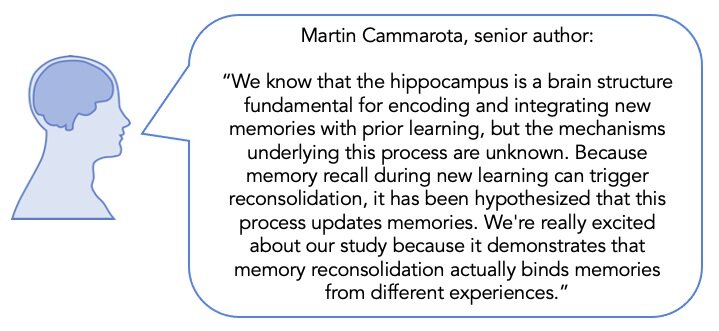Dopamine Controls How New Information Updates Reactivated Memories
Post by Leanna Kalinowski
What's the science?
When new memories are acquired, they are initially unstable. The process of memory consolidation is required to stabilize new memories. Consolidated memories are long-lasting, however when reactivated during memory recall, these memories can become destabilized once again. Memory reconsolidation is the process of restabilizing memories that were destabilized during the recall process. While it is known that memory reconsolidation is a protein-synthesis-dependent process and can be impacted by dopamine receptor blockade, its biological role is not fully understood. This week in PNAS, Gonzalez and colleagues tested whether hippocampal dopamine D1/D5 receptors control whether new memories are linked to old ones through reconsolidation or whether they are consolidated as independent traces.
How did they do it?
Rats underwent a novel recognition task, a common test of episodic memory (memory of events) that capitalizes on rodents’ innate preferences for novelty by measuring the amount of time spent interacting with a previously encountered versus novel object. In this experiment, rats first underwent a training session where they were exposed to two different but behaviorally equivalent novel objects (objects A and B). 24 hours later, they underwent a reactivation session where they were exposed to a familiar object from the training session (object A) and a novel object (object C) to destabilize the memory. 24 hours after this, memory retention was tested by exposing the rats to one of three test sessions: 1) exposure to an object from both the training and reactivation sessions (object A) and a novel object (object D), 2) exposure to an object from only the training session (object B) and object D, or 3) exposure to an object from only the reactivation session (object C) and object D. Time spent interacting with each object was measured.
Twenty minutes before the reactivation session, rats received an infusion of either saline or a dopamine D1/D5 receptor antagonist into the CA1 region of the hippocampus to test whether dopamine D1/D5 receptor blockade impacts memory destabilization. Five minutes after the reactivation session, rats were then given one of four substances into the CA1 to pharmacologically dissociate consolidation and reconsolidation: saline, to serve as a control; anisomycin, which inhibits consolidation and reconsolidation by blocking protein synthesis; AIP, which inhibits consolidation by blocking CaMKII activity; or ZIP, which inhibits reconsolidation by blocking PKMζ activity.
What did they find?
First, the researchers found that rats given saline after reactivation were able to discriminate familiar objects from the novel object regardless of their treatment before reactivation, showing that dopamine inhibition has no effect on memory retention. Next, they found that dopamine inhibition is necessary for memory destabilization but does not protect against amnesia induced by anisomycin.
Finally, they found that the memory of a new object during recall of an old object can be formed by either consolidation or reconsolidation mechanisms, depending on the activation state of hippocampal D1/D5 receptors. The first mechanism, which was activated when dopamine receptors were inhibited, leads to new memories being formed through consolidation. This requires activation of CaMKII and would be employed when new experiences share little similarity with old ones. The other mechanism, which was activated when dopamine receptors were activated, leads to new memories being formed through reconsolidation. This requires activation of PKMζ and would be employed when information from novel and past events overlap. The latter mechanism is essential for the construction of schemas, which are networks of related knowledge that help animals to rapidly incorporate new information into related representations to preserve its relevance.
What's the impact?
This study shows that, depending on the activation of hippocampal dopamine D1/D5 receptors, the memory of a novel object that was presented during recall of a familiar object can be formed by either consolidation or reconsolidation; however, only reconsolidation can link memories of the two objects together. Given that learning seldom occurs in a cognitive vacuum, these findings have broad implications for how new memories are linked with old ones during the reconsolidation process. They also highlight the importance of considering these mechanisms during reconsolidation-based psychotherapy, since recall of a single memory during these sessions can make other memories within the schema susceptible to modification.
Gonzalez et al. Dopamine controls whether new declarative information updates reactivated memories through reconsolidation. PNAS (2021). Access the original scientific publication here.


